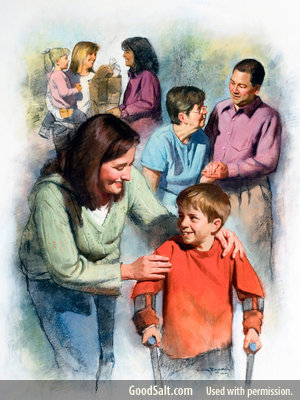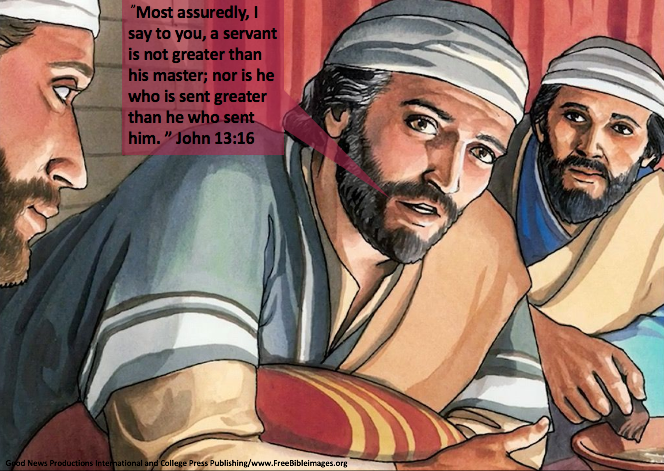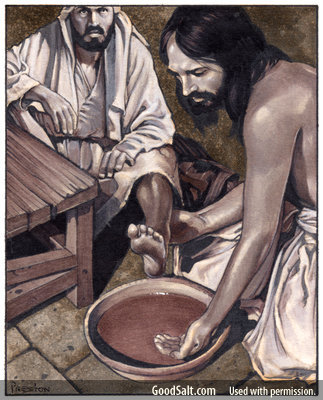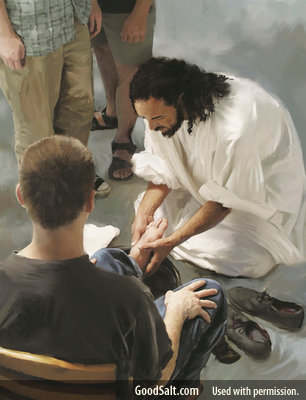“I do not speak concerning all of you. I know whom I have chosen; but that the Scripture may be fulfilled, ‘He who eats bread with Me has lifted up his heel against Me.’ ” John 13:18
In 1858 the Illinois legislature – using an obscure statute – sent Stephen A. Douglas to the U.S. Senate instead of Abraham Lincoln, although Lincoln had won the popular vote. When a sympathetic friend asked Lincoln how he felt, he said, “Like the boy who stubbed his toe: I am too big to cry and too badly hurt to laugh.” 1 No doubt many political candidates can empathize with how Lincoln felt after last week’s elections.
In some way or form, all of us will experience rejection – that feeling of being unwanted. You feel that you are not liked or accepted. In fact, the majority of people may reject us rather than accept us. Although some people are special to us they may reject us as well. Jesus experienced rejection by many people, but none perhaps as difficult as the rejection by one of His own disciples. Jesus will now teach us how to recover from rejection. We must first…
LOOK TO THE BIBLE FOR GOD’S PURPOSE (John 13:18). Jesus had just finished washing the feet of His disciples to give them an example of how they were to humbly serve one another (John 13:1-16). Christ told them they would be “blessed” if they not only knew this, but did it (John 13:17). However, there would be no blessedness for one of Christ’s disciples.
Jesus said to His disciples, “I do not speak concerning all of you. I know whom I have chosen; but that the Scripture may be fulfilled, ‘He who eats bread with Me has lifted up his heel against Me.’ ” (John 13:18). Jesus “knew” the disciples He had “chosen” for service, not salvation, and that one of them would betray Him. Jesus wanted His disciples to realize that He knew the future and was in control. Christ was not fooled by Judas. Judas was chosen by Jesus as one of the disciples so “that the Scripture may be fulfilled” in Psalm 41:9, where King David endured the painful rejection of his table companion, Ahithophel, who later hanged himself (2 Samuel 16:20-17:3, 23). 2 Likewise, Judas, Jesus’ close companion, would betray Christ and then hang himself (Matthew 27:3-5). Even though Judas’ betrayal of Jesus was foreknown by God, Judas was still responsible for his actions.
To “eat” bread with someone is a picture of fellowship. In the first century, to lift up your “heel” to show someone the bottom of your foot so as to shake off the dust is an expression of rejection. It was a gross breach of hospitality to eat bread with someone and then turn against them. Yet this is what Judas did. He had been a companion of Jesus for over three years and now he was about to do the unthinkable and betray His loving Teacher.
Jesus was not surprised by Judas’ betrayal because the Bible predicted it hundreds of years earlier. Christ shares this with His disciples so they can know that Judas’ betrayal is a part of God’s plan and purpose. Jesus also wants His disciples to know that they also will experience rejection as they carry on His mission after He is gone. They are to look to the Scriptures for God’s purpose amidst their rejection.
Likewise, we can also know that God has a purpose for us when we experience painful rejection. For example, Romans 8:17 says, “And if children, then heirs – heirs of God and joint heirs with Christ, if indeed we suffer with Him, that we may also be glorified together.” Suffering from rejection prepares believers to be “joint heirs with Christ” as co-rulers with Him in His coming Kingdom on earth.
In his book entitled, “Don’t Waste Your Sorrows,” Paul Billheimer writes, “If the Bride [of Christ] was to be qualified to rule with Him, she also had to suffer. This illuminates the passage in Second Timothy 2:12, ‘If we suffer, we shall also reign with him.’ Therefore, suffering is inherent in God’s universe.” 3 Billheimer also writes, “God … designed that suffering, which is a consequence of the Fall, shall produce the character and proper disposition – the compassionate spirit that will be required for rulership in a government where the law of love is supreme.” 4
The Bible explains that one of God’s purposes in allowing us to experience rejection is to prepare us for rulership with Christ in His future Kingdom on earth. Knowing this can enable us to endure rejection in preparation for our role as co-rulers with Jesus (2 Timothy 2:12; Revelation 2:25-27; 3:21).
Prayer: Lord Jesus, thank You so much for this message today which reminds me that You do know the future and You are in control. I can trust You to accomplish Your plan and purpose even when I experience rejection from those who are close to me. My normal response to rejection is to want to be in control and retaliate. But this is not Your way. Please help me to respond to the pain of rejection by looking to Your promises to find comfort and hope. I want to be more like You so I can reign with You in Your coming Kingdom on earth. Instead of responding to rejection with contempt, please help me to respond with compassion, realizing that You are in control and You are using this event to fulfill Your plan and purpose for my life. In Your name I pray. Amen.
ENDNOTES:
1. Max Lucado, God Came Near (Multnomah Press, 1987), pg. 57.
2. Edwin A. Blum, The Bible Knowledge Commentary, New Testament Edition, Editors John F. Walvoord and Roy B. Zuck, (Wheaton: Victor Books, 1983), pp. 320-321.
3. Paul Billheimer, Don’t Waste Your Sorrows (CLC Publications, 1977), location 316.
4. Ibid., location 95-102.









